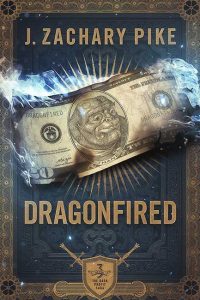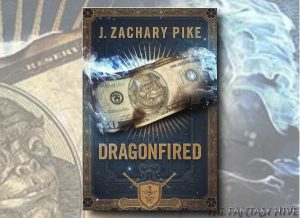DRAGONFIRED by J. Zachary Pike (BOOK REVIEW)
Gorm Ingerson and the king of Andarun both have a problem: each other. While the Freedlands are plagued with market turmoil, civil unrest, and dire portents, Gorm is convinced he’s found the heart of the king’s dark conspiracy. But the powers that be, Arthly and otherwise, are watching Gorm, and if he’s not careful he’ll wind up terminated in every sense of the word.
Dragonfired will be the epic conclusion to The Dark Profit Saga.
Expected publication date 1st September 2023
This is the third and concluding volume in the Dark Profit Saga where Pike has taken accurate and acerbic aim at contemporary socio-economic issues through the medium of wise cracking action packed epic fantasy. While the middle book Son of a Liche advanced and developed the themes introduced in Orconomics it left some threads distinctly untied. For example, the venal Paladin Johan has yet to meet his comeuppance while the Berserker Dwarf Gorm’s associates have yet to resolve their various will-they won’t they romantic entanglements in courtships so fraught and hesitant they make Pride and Prejudice look like a one night Tinder hook up. Then again an arrow through the throat can be so easily misinterpreted and surely mute body language can only take you so far.
The story resumes some months after the concluding events of Son of a Liche. Gorm is frustrated that the defeat of the Liche has not brought down Johan as well
“I thought … our side so clearly in the light of justice, his so clearly in the wrong, I thought we’d be back in one of them perfect moments. But it ain’t. It’s all complex.”
Consequently, the berserker dwarf has gone back adventuring, albeit with only part of his crew as Heraldin the bard and Jynn the noctomancer have other irons in the fire. However a burned out village and some papers beneath a corpse offer a fresh but somewhat inflammatory line of enquiry.
 Thane the formidable troll is far away acting as bodyguard to the perennially in danger gnome financier Duine Poldo and his troup of chittering wood gnomes. I enjoyed the temporary refuge they had found amongst the lawyer monks of Adchil – a group so litigiously risk averse that a simple ‘good morning’ must be accompanied by lengthy disclaimers to the effect that said greeting is offered without prejudice and that no legally binding contractual promise of a morning of any specific quality is implicit in the salutation.
Thane the formidable troll is far away acting as bodyguard to the perennially in danger gnome financier Duine Poldo and his troup of chittering wood gnomes. I enjoyed the temporary refuge they had found amongst the lawyer monks of Adchil – a group so litigiously risk averse that a simple ‘good morning’ must be accompanied by lengthy disclaimers to the effect that said greeting is offered without prejudice and that no legally binding contractual promise of a morning of any specific quality is implicit in the salutation.
Pike continues to offer Pratchett-esque insights into contemporary society. For example his assertion that “ignorance is a commodity” and that “Governments rise and fall based on the careful cultivation and utilization of mass ignorance” rang sadly true to my ear.
Asherzu – chieftain of the Guz-Varda orc tribe and now CEO of Warg incorporated is leading her tribe to conquer markets and stock exchanges rather than countries and races, as they channel their aggression into paper trades rather than bloodied corpses. I enjoyed their wrestling with the unfamiliarity of the boardroom and the absurdity of corporate mission statements. It is fitting perhaps that in the book’s denouement, the Guz-Varda are far from the tumultuous gore spattered battle with the ultimate foe and are instead embroiled in a more financial conflict at the other end of city in scenes that brought images of the film Trading Places to my mind.
Pike’s world building rests as ever on the commercialisation and bureaucratisation of hack and slay adventuring, with businesses investing and trading in what might be termed ‘quest futures’ whose value depends on the assumed worth of the target hoard (not to be confused with the target horde). Of course, the paper value of some hoards, just like the great south sea bubble of the eighteenth century, or the tulip frenzy of seventeenth century Holland, turn out to bear little relation to physical reality.
Pike’s multiple points of view ensure a sprawling tale of diverse but compelling characters. While Gorm – as name or main protagonist – may be the pilot of the piece, the others are far from passengers. I particularly liked Thane’s soft and oft repeated rehearsal of how he would introduce himself to Kaitha if ever the chance arose.
“Hello, Kaitha. My name is Thane.” The troll breathed the words like a mantra.
Its simple carefully practiced sincerity reminded me, albeit with a less homicidal intent, of Inigo Montaya’s refrain from The Princess Bride
Heraldin and Gaist continue to make a well-matched pair, the one blabbermouth the other silent so they average out at a kind of normal loquaciousness. Which is not to say that Gaist is uncommunicative – Pike takes the aphorism that 70-90% of all communication is non-verbal, and credits Gaist with a remarkable eloquence that is largely revealed through Heraldin’s replies.
Laruna the fire-wielding solomancer has some personal issues to work out and I enjoyed her impatient excursion into spirit guided therapy. In their varied extremes, the diverse members of Gorm’s entourage do overall make for a balanced party – provided they are all present.
The plot twists and turns as surprisingly as one would hope, building through various peaks to a long drawn final crescendo of violence and sacrifice where nobody is safe and nothing is certain. Which reminded me a bit of the third film in the Scream movie franchise where the rules of a trilogy are set out in this clip and also listed here
-
“You’ve got a killer who’s gonna be superhuman. Stabbing him won’t work, shooting him won’t work. Basically in the third one, you gotta cryogenically freeze his head, decapitate him, or blow him up.”
-
“Anyone, including the main character, can die. This means you, Sid.”
-
“The past will come back to bite you in the ass. Whatever you think you know about the past, forget it. The past is not at rest! Any sins you think were committed in the past are about to break out and destroy you.”
-
Of course the premise behind these rules that Scream 3 was concluding a trilogy was somewhat undermined by the fact that Scream 3 was followed by Screams 4,5 and 6! I think readers will find Pike’s concludes his saga somewhat more emphatically and with less scope to resurrect the same themes.
You can certainly see elements of these rules at work in Dragonfired. For example Pike reaches a long way into his world’s past as we discover the truths about the Sten, the foundation of the various religions, the reason for the Al-Matra’s (All Mother) constant random ramblings that have defied attempts at interpretation for centuries and at last understand Johan’s abrupt elevation from party bit player into shining and unbeatable Paladin.
It makes a great tale, but one with a heart. I enjoy my satire, and while arguably fantasy is supposed to offer us an escape from reality, it can also give us a chance to look at reality from a safe space. Much as Kaitha in Son of a Liche and Laruna in Dragonfired learn some hard truths about their own lives through interactions with spiritual therapists, a reader gets a different angle on a contemporary issue. For me, this came across most clearly in the discussions between the lightling gnome Duine Poldo and his faithful shadowkin associate the gnoll Mrs Hrurk. I found Fiesta Hrurk’s quest for answers at least, if not justice, in the case of her husband’s untimely death echoing the Black Lives Matter movement in challenging so many deaths in police custody – and the assumption that the ‘good guys’ can never do wrong. The honest and honourable Poldo’s efforts to help draw out matters of privilege and the challenges of well-meant efforts to help people whose circumstances you really cannot comprehend as touched on this (slightly abridged) exchange.
“Perhaps if I reached out to my acquaintances at Fordun and Hawks, we could… it might work,” the Gnome said. “It really is all about who you know.”
“No, Mr Poldo. It really is all about what you are… I still feel that I live in a Lightling’s world and that I can only have what a Lightling chooses to give me.”
The Gnome bit back his response. He recalled telling Thane that the evil that was hardest to spot was the one lurking in his own good intentions.
This sombre but ultimately companionable encounter ends too soon due to an unwelcome interruption because – as Pike puts it – “the universe is just as full of cruel irony as any other kind.”
Indeed, irony seasons Dragonfired just as it does the other books in the Dark Profit Saga. Pyke foregrounds irony through the many principles of irony that have been mathematically established by Nove “the greatest of the fifth age’s philosopher-scientists.” Pike ultimately lists seven principles which all ring terribly true to (any) life – for example the fourth principle that planning increases the possibility of an unforeseen outcome! It is the kind of narrative inventiveness that Terry Pratchett or Douglas Adams would both have delighted in.
So all in all a barnstorming conclusion to a blisteringly entertaining trilogy!
Dragonfired is due for release this autumn. Find out how you can pre-order a copy on J. Zachary Pike’s Website


[…] really enjoyed my ARC of Dragonfired the last book in the Dark Profit Saga (My review is available here ) particularly for how the pantheon of Gods comes together and we finally understand the ramblings […]